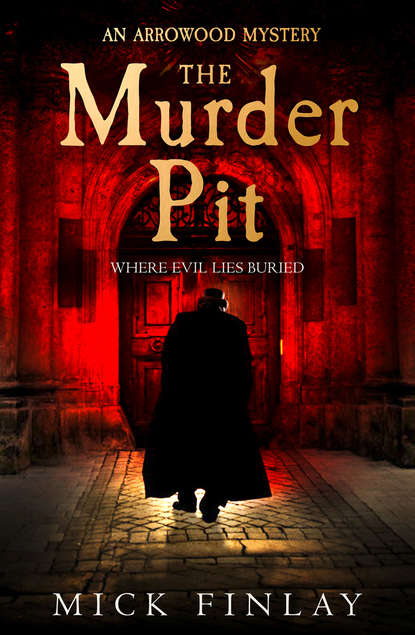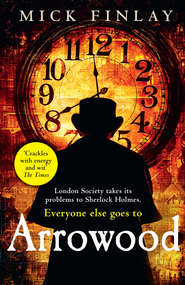По всем вопросам обращайтесь на: info@litportal.ru
(©) 2003-2024.
✖
The Murder Pit
Автор
Год написания книги
2019
Настройки чтения
Размер шрифта
Высота строк
Поля
‘What are you going to do, Norman?’ he asked, bringing me back from my thoughts. ‘Now that Mrs Barnett . . . well, now you’re on your own?’
‘Just keep on, William. What else?’
‘I mean, are you going to stay in that room? Isn’t it lonely?’
‘For now,’ I said, hearing my voice lose its strength. ‘But we’ll see. I just don’t know.’
He watched me for some time, then we fell back to reading our papers. My eyes scanned the words but now my head was so full of memories I couldn’t take in any of the meaning. Soon the guvnor’s paper fell on the floor. He was asleep, his chin fallen on his chest, snoring like a fattened Berkshire. I took the pipe from his mouth, put it on the mantel, and left the house.
*
The Ockwell graves were in a corner behind the church. I found the baby’s marker quickly. The small stone was still fresh, a simple crucifix above the name: Abigail Ockwell, 12 November–13 November, 1893. Beloved daughter. There were no other recent graves, no other little Ockwells by her side. Her grandfather was buried there, 1891, his stone bigger than the child’s, almost up to my waist, a space on it for his wife still clinging on to life from her sickbed. At the bottom of the stone, a fourth child: Henry Ockwell, died aged four, 1863. Around these two graves the grass was clipped short, but further back it grew longer. Here were the ancestors, the great- and great-great-grandparents, great uncles and aunts, the dates stretching back to the 1600s.
It was half three or so when I reached Mrs Gillie’s camp. The trees all around were still, even the shining black crows above were silent. There was old Tilly, packed in sacking, looking at me like I’d come to rescue her. There the remains of the fire, the kettle. There was little left of the cat but bone and bloody fur. I opened the caravan door and went in: her coat and boots were just as we left them. The red box that had been on the floor outside was now inside, the broken flowers gone. Someone had been here and tidied them away.
I walked around the copse again, checking under the rhododendron and holly, kicking through piles of dead leaves. I climbed over the fence into the fields and searched the ditches and hedges and paths all around.
She wasn’t there.
In the cold twilight, I led the horse over to the stream, where I broke up the ice for her to drink. Then I tied the horse again and filled her nosebag. She looked at me like she wanted an explanation.
‘No idea, mum,’ I said. She snorted and pushed her nuzzle into my shoulder.
When I got back to the parsonage, night had fallen. Sprice-Hogg was back, and he and the guvnor sat in the parlour drinking port, a bowl of boiled eggs between them upon the couch, their stockinged feet stretched out to the fire.
‘They’ve cleared away the evidence,’ said the guvnor when I’d told them about the red box. He rose, brushed the bits of eggshells from his crotch, and began to pace the painted floorboards. ‘But where is she, damn it! She could be lying injured somewhere. And it’s our fault.’
‘Your fault?’ asked Sprice-Hogg.
‘People who’ve helped us with information have been hurt before,’ said the guvnor. His eyes fluttered. ‘She had a premonition. Why else would she talk about her own death the way she did? She must have worried we’d tell someone and we did. We told Root what she’d said.’
‘We don’t know it had anything to do with her talking to us, sir,’ I said. ‘It could have been thieves, or someone come looking for her sons.’
‘It was right after she told us about her husband and the children!’ barked the guvnor. ‘Someone doesn’t want us investigating. Why else would they clear away the evidence of a struggle? Tell me, Bill, d’you know anything about three children dying at the farm in the last few years? Mrs Gillie mentioned it. Only one was buried.’
The parson shook his head. ‘Polly’s poor child died about three years ago, God rest her soul, but there haven’t been any other children up there for years. William, really, I wouldn’t take what Mrs Gillie says too seriously. A little too fond of the gin, that one.’
‘D’you really think Root let it out?’ I asked.
‘He’d only have to mention it in the pub,’ answered the guvnor. ‘Either that or we were being watched.’
‘I’ll go down to her caravan in the morning,’ said Sprice-Hogg. ‘I’m sure she’ll be back by then. If not, I’ll try and persuade Sergeant Root to organize a search party.’
‘Thank you, Bill, that would help. One more question: d’you ever see the farm labourers?’
The parson shook his head. ‘They’ve never been to church, I’m afraid, and I don’t think I’ve seen them in town either. They keep to themselves.’
Sarah pushed open the door and began to lay the table for soup.
‘How’s your sister, Sarah?’ asked the guvnor.
She shook her head. ‘Not long now, sir,’ she said, so low it was hard to make out. It must have distracted her, for as she lifted the soup tureen from the tray she stumbled. Sprice-Hogg let out a shriek as it fell on its side on the table, its lid off, the soup pouring out over the napkins and cutlery.
‘Useless heifer!’ he barked, raising his arm as if to strike her. Sarah flinched, covering her face, but he checked his hand, lowering it slowly to the table.
‘I’m sorry, sir,’ she said, again and again, trying to mop it up with her pinafore. She began to cry.
‘You are a singularly stupid girl,’ muttered the parson, sitting watching her from his chair. ‘Don’t think I’ve forgotten about that blue streak last week either.’
‘It wasn’t her fault, Bill,’ said the guvnor, kneeling to clear the floor with a napkin. ‘Her skirt snagged on a nail.’
The parson glared at her; she kept her eyes down, sniffing, scraping the thick soup from the table onto the tray. Finally, she turned and hurried from the room.
‘Have a seat, gentlemen,’ said Sprice-Hogg, the irritation still in his voice. ‘At least there’s enough for half a bowl each.’
When we’d eaten, the parson brought over the decanter of port. After two more glasses, the guvnor shook his head.
‘We’ve work to do this evening, my friend.’
The parson’s face fell.
‘Please, indulge me, William. It’s an excellent barrel. And I’m eager to hear if you enjoyed my book.’
‘I haven’t had a chance to read it yet, though I’m looking forward to it very much. But now we must go and see if we can find Godwin. I’m hoping he’ll be more approachable with a few drinks in him.’
‘Just one more? For friendship sake?’
‘We cannot.’
‘Of course,’ agreed the parson, putting the stopper back on the decanter. He looked at the ruby liquid as the flame from the lamp played on it and sighed. ‘We did enjoy ourselves the other night, didn’t we?’
Chapter Twelve (#ulink_1d9b9676-03a2-525f-8d13-eb3a7c4736e9)
The pub fell silent as we came through the door. It was packed out: the three old blokes who never seemed to leave were there, the fellow with the wizened grandmother, Skulky, Edgar, and twelve or thirteen others, all of them red-faced in the close heat of the fire. Under one of the tables slept a baby in a wooden box, a bottle of Dalby’s Calmative in her hand; a girl of four or five smoked her ma’s pipe by the fire. Even Root was standing at the counter, his eyes half-closed.
Godwin sat in the corner next to the lady he was having a shunt at before. He was the only one in that baking hot pub with his jacket on and was suffering from it: his brow was damp, his neck out in blotches. He scowled at us as we found a couple of empty seats by the door.
‘Thought you said you chased these two off, Godwin!’ cried the coalman, a great Welsh bloke with a glass eye that shone out of the grime of his ruined face.
‘What’d you do, wave your flipper at them?’ called one of the old blokes from across the room. A great peal of laughter arose.
Godwin looked away, taking a long draw of his tankard. He whispered to the woman, who nodded and patted his knee.
I got us some drinks. The landlady was half-cut: she moved about like she had two wooden legs and now and then let out a growling burp into the great hubbub of the drinkers. The old dog staggered over to me very slow, his legs shaking, his eye gunked like a smashed-up egg. I pushed him away toward the little girl, who made a grab for his fur.
We sat there in the noise, watching them all drink and shout, spending their wages, baked by the blazing fire and the heat of their chat.
‘My Lord, this is a drunken pub,’ said the guvnor at last. I could tell he was uneasy by Skulky and Edgar being there, so sure was he that they’d been about to rob us the other night. They stood by the skittles table in their checked shirts and waistcoats. Their beards were wilder and bushier than any other, and it seemed to give them a level above the other men. Next to them was a short bloke in a moleskin jacket and a battered bowler: Weavil, I guessed. They were watching us, whispering.
Другие электронные книги автора Mick Finlay
Arrowood




 0
0






